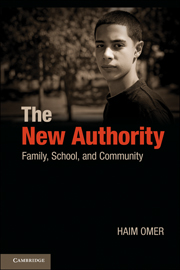Book contents
- Frontmatter
- Contents
- Foreword
- 1 The New Authority
- 2 Vigilant Care
- 3 Children's Violence Within the Home
- 4 Enlisting Support in the School
- 5 Presence and Supervision at School
- 6 Publicity and Reparation
- 7 Involving Students in the Campaign Against Violence
- 8 The New Authority in the Community
- References
- Index
Foreword
Published online by Cambridge University Press: 05 May 2016
- Frontmatter
- Contents
- Foreword
- 1 The New Authority
- 2 Vigilant Care
- 3 Children's Violence Within the Home
- 4 Enlisting Support in the School
- 5 Presence and Supervision at School
- 6 Publicity and Reparation
- 7 Involving Students in the Campaign Against Violence
- 8 The New Authority in the Community
- References
- Index
Summary
The main purpose of this book is to answer the question: What kind of adult authority is appropriate for a free and pluralistic society, and how can it be achieved?
The breakdown of parental and educational authority in the past decades is one of the causes of the dramatic rise in violence and delinquency among children and teens. However, parents and educators justifiably are deterred by a kind of authority that is based on intimidation, blind obedience, and brutal force. The conflict between the desire to restore their authority and the need to adjust it to current social values creates a dilemma for parents and educators: How can they exercise their authority while maintaining the values of autonomy and cultural pluralism?
In this book, Haim Omer presents a theoretical and practical solution for that dilemma by the concept of the new authority. This concept is the product of a long and multifaceted process of thought and action. The beginning of the process can be traced to the publication ten years ago of the book Restoring Parental Authority, his first book on parenting. That book set off a lively public debate. When the book was published, the concept of authority was almost considered indecent in public-therapeutic discourse, and connecting it with parenting drew a lot of misunderstanding. The concept often was misconstrued as advocating a demanding and tough style of parenting, insufficiently attuned to the child’s needs.
- Type
- Chapter
- Information
- The New AuthorityFamily, School, and Community, pp. vii - xiiPublisher: Cambridge University PressPrint publication year: 2010



